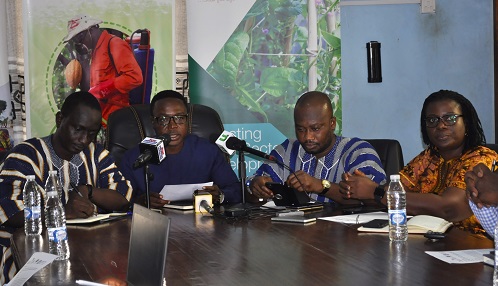
Stakeholders in the country’s agricultural sector have called on the government to restore the tax exception on agro-inputs.
They are CropLife Ghana, Chamber of Agribusiness Ghana, Peasant Farmers Association of Ghana (PFAG), National Seed Trade Association of Ghana (NASTAG) and the Ghana Rice Interprofessional Body (GRIB).
The Executive Director of PFAG, Dr Charles Nyaaba, speaking on behalf of the stakeholders at a press conference held in Accra, said the delay in granting the tax exemption by the Minister of Finance upon the request by the Ministry of Food and Agriculture (MOFA) had dire consequences for the sector, which is already battling high input and machinery cost, high cost of shipment, depreciation of the cedi and high transport cost associated with high fuel prices.
“Most farmers in 2022 produced at a loss, some had to scale down their production and others sort alternative business. A situation that led to low food supply, high food prices contributing to a record high inflation of 54 per cent in December 2022, and this situation will be compounded if taxes are further imposed on agro-based products,” he said.
The President on September 12, 2022 assented to the tax exemption Act 2022, Act 1083, which is meant to regulate the application of tax exemptions and create an exemption regime for imported goods.
However, agricultural goods and equipment were not included in the list of items exempted from import duties. This, experts say, contradicts government’s policy of transforming the economy through agricultural production.
Dr Nyaaba appealed to the Minister of Finance, Ken Ofori-Atta, to as a matter of urgency speed up in granting the request from MoFA, and grant exemptions to the agricultural commodities, and that the government and Parliament should take a second look at the Exemptions Act and take steps to include agricultural goods and equipment which were key to economic growth.
Representing the importers of agro-inputs, Mr David Ansong, Managing Director, Rainbow Agrosciences, said unlike initially when the total expenses on imported goods at the port was at a margin of 5 per cent, now due to the exemptions, they were paying up to 20-25 per cent which had increased production cost.
“The government should take note that we can just push the extra cost to the farmer but because we all want the sector to grow we have kept patience and hesitated to increase the price of agro-inputs to make up for the loss. Last year when the cost of agro-inputs slightly moved up, we observed maize production was affected and a lot of farmers went into Soya beans and other crops because the cost of production was low. This also have the repercussion to affect the unemployment situation in the country because now for instance if I import less containers, I will need less workers for work,” he said.
The President of Ghana Rice Interprofessional Body, Nana Adjei Ayeh II, urged the Ministry of Agriculture to take full responsibility and push the Finance Minister to give the exemption.
“This baffles me that as a government that wants to grow the agric sector, you are at the same time putting levies on agro-inputs. It will get to a time no one will like to do farming anymore because currently we are struggling to make our margins, and if these agro-inputs companies want to double up their product prices how can we survive,” he bemoaned.
The Chamber of Agribusiness Ghana, led by Mr Anthony Morrison, implored all stakeholders in the agric sector to rise up and fight against the tax being imposed on agro-inputs.
BY KINGSLEY ASARE




